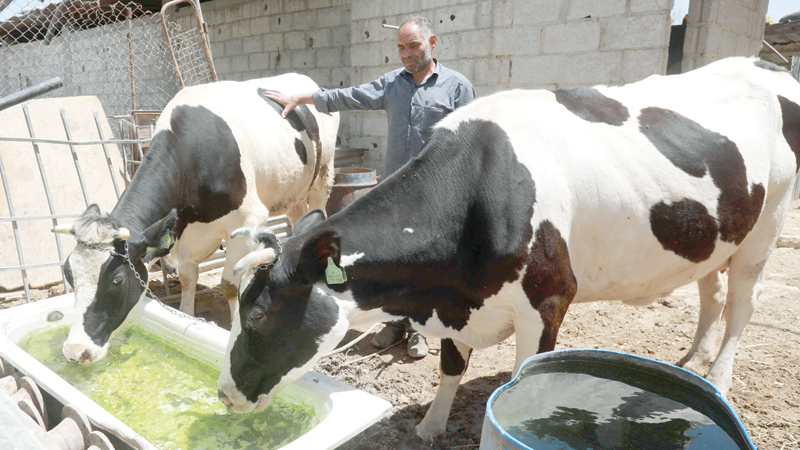

Deir al Asafir: Outside the Syrian capital, Radwan Hazaa is preparing to plant hundreds of pomegranate seeds on his land in Eastern Ghouta, hoping to replace some 3,000 trees lost in years of war.
The former rebel stronghold was once the garden of Damascus, supplying abundant fruit and vegetables as well as dairy products to the capital.
But intense bombing during a five-year blockade by the army that ended in the negotiated withdrawal of rebel forces and their families last year has taken its toll on the land.
His feet washed by the flow of water from a newly dug well, Hazaa labours away digging an irrigation canal that he hopes will help bring life back to his plot in the village of Deir al Asafir.
Hazaa returned last year, six years after fleeing for the relative safety of Damascus when fierce fighting erupted in Eastern Ghouta.
“When I saw my scorched plot, I fell to my knees and cried,” said the balding 54-year-old.
“It felt like I would have to start over from scratch,” said the farmer, a red and white chequered headscarf slung over a shoulder.
Only a few dozen of the 3,500 pomegranate, apricot and walnut trees he boasted before the war were still standing, he said.
The rest had died from fire or lack of water during the fighting.
“I borrowed some money and started rebuilding, with two cows and a small number of chickens,” Hazaa said.
To bring his orchard back to life, the farmer is pinning his hopes on this winter’s record rainfall.
“In my entire life, I’ve never seen rain that heavy,” he said.
“We used to have to dig down up to 150 metres to find water, but this year we only had to dig down 40 metres for water to gush out.”
On a nearby farm, cattle farmer Bassam Al Laz too gave thanks for this year’s plentiful rain.
“When the rain fell, it blessed the land, animals and humans,” said the 50-year-old, dirt covering his black trousers.
Since the start of the war, “this is the first time the cows are eating grass from my own land instead of me having to buy them feed.”
Many farmers were reduced to slaughtering their livestock during the war as they could not feed them, especially in blockaded areas, according to the Syrian Centre for Policy Research.
After government forces imposed a blockade on Eastern Ghouta in 2013, sparking severe fuel shortages, Laz says he watched his crops and cattle die one after the other.
Each time, “it was as if I was losing one of my children,” he said.
Laz said he was “glad the war has ended”, after suffering “irreplaceable losses”. Among these, “we lost olive trees that were more than 500 years old,” he said.
At the Deir al Asafir municipality, local official Ahmad al Hasan listened to the demands of farmers, most of them to do with irrigation.
“Their lands will return to what they once were,” he said, adding that farmers were more optimistic after the plentiful rain.
Eastern Ghouta covers an area of around 10,400 hectares more than half of which are cultivated.
The region is the “primary source of the capital’s food, the lungs through which Damascus breathes”, Hasan said. “Every single house has a surrounding plot with cows and chicken.
“Everyone works the land: the elderly and the young, men and women.” — AFP
Oman Observer is now on the WhatsApp channel. Click here



